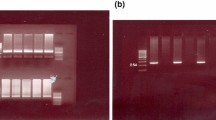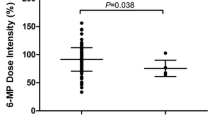Abstract
Purpose
Toxicity of 6-Mercaptopurine (6MP) is related to single nucleotide polymorphism (SNP) in genes coding for metabolizing enzymes, with TPMT analysis being recommended prior to maintenance therapy. However, ITPA and NUDT15 polymorphisms appear more important in the Asian population.
Method
In this study 63 consecutive patients with ALL, entering maintenance phase of therapy, were evaluated for TPMT, ITPA and NUDT15 polymorphisms by PCR RFLP and confirmed by sequencing. Hematological and hepatic toxicities were monitored for 36 weeks. The groups with and without any of the three studied polymorphisms (Risk SNP + and Risk SNP-) were compared.
Results
Eighteen (28.6%) patients had major polymorphisms, 17 being heterozygous. ITPA(198CA): 11(17.5%); NUDT (415CT): 6(9.5%) and TPMT*3C: in 2(3.1%). Mean cumulative dose of 6MP was lower: 10927 mg/m2 in group with one of the polymorphisms compared to 12533 mg/m2 in the group without a polymorphism (p = 0.009). The group with Risk SNP + tolerated lesser weeks of full-dose 6MP chemotherapy (20.81 vs 30.40 weeks; p = 0.001). Risk of neutropenia > 3 weeks was pronounced in Risk SNP + group. The individual TPMT, ITPA and NUDT15 polymorphism subgroups had similar cumulative 6MP dose and chemotherapy interruptions. There was no difference in the average cumulative dose of methotrexate in the two groups. No significant hepatotoxicity was noted.
Conclusion
Polymorphisms in ITPA and NUDT15 have a greater prevalence in the north Indian population. Patients with these SNPs tolerate lower doses of 6MP.




Similar content being viewed by others
Abbreviations
- 6 MP:
-
6-Mercaptopurine
- SNP:
-
Single nucleotide polymorphism
- ALL:
-
Acute lymphoblastic leukaemia
- TPMT:
-
Thiopurine methyltransferase
- ITPA:
-
Inosine triphosphate pyrophosphatase
- NUDT15:
-
Nucleoside diphosphate linked moiety-type motif 15
- ICICLE:
-
Indian Childhood Collaborative Leukaemia Group 2015
- MTX:
-
Methotrexate
- PCR-RFLP:
-
PCR amplification and restriction enzyme digestion
- ALT:
-
Alanine transferase
- FN:
-
Febrile neutropenia
- ANC:
-
Absolute neutrophil count
- HWE:
-
Hardy Weinberg equilibrium
- ANOVA:
-
Analysis of variance
- 6TGN:
-
6-Thioguanine
- TLC:
-
Total leucocyte count
- CBC:
-
Complete blood count
- PCR:
-
Polymerized chain reaction
References
Wall AM, Rubnitz JE (2003) Pharmacogenomic effects on therapy for acute lymphoblastic leukemia in children. Pharmacogenomics J, 3:128
Evans WE et al (2001) Preponderance of thiopurine S-methyltransferase deficiency and heterozygosity among patients intolerant to mercaptopurine or azathioprine. J Clin Oncol 19(8):2293–2301
Moriyama T, Relling MV, Yang JJ (2015) Inherited genetic variation in childhood acute lymphoblastic leukemia. Blood 125(26):3988–3995
Relling MV et al (1999) Mercaptopurine therapy intolerance and heterozygosity at the thiopurine S-methyltransferase gene locus. J Natl Cancer Inst 91(23):2001–2008
Relling MV et al (2013) Clinical pharmacogenetics implementation consortium guidelines for thiopurine methyltransferase genotype and thiopurine dosing: 2013 update. Clin Pharmacol Ther 93(4):324–325
Chang JG et al (2002) Molecular analysis of thiopurine S-methyltransferase alleles in South-east Asian populations. Pharmacogenetics 12(3):191–195
Srimartpirom S et al (2004) Thiopurine S-methyltransferase genetic polymorphism in the Thai population. Br J Clin Pharmacol 58(1):66–70
Tanaka Y et al (2012) The activity of the inosine triphosphate pyrophosphatase affects toxicity of 6-mercaptopurine during maintenance therapy for acute lymphoblastic leukemia in Japanese children. Leuk Res 36(5):560–564
Yang SK et al (2014) A common missense variant in NUDT15 confers susceptibility to thiopurine-induced leukopenia. Nat Genet 46(9):1017–1020
Chiengthong K et al (2016) NUDT15 c.415C> T increases risk of 6-mercaptopurine induced myelosuppression during maintenance therapy in children with acute lymphoblastic leukemia. Haematologica 101(1):e24–e26
Yates CR et al. (1997) Molecular diagnosis of thiopurine S-methyltransferase deficiency: genetic basis for azathioprine and mercaptopurine intolerance. Ann Intern Med 126:608–614
Cao H, Hegele RA (2002) DNA polymorphisms in ITPA including basis of inosine triphosphatase deficiency. J Hum Genet 47:620
Schmiegelow K et al (2014) Mercaptopurine/methotrexate maintenance therapy of childhood acute lymphoblastic leukemia: clinical facts and fiction. J Pediatr Hematol Oncol 36(7):503–517
Kapoor G et al. (2010) Thiopurine S-methyltransferase gene polymorphism and 6-mercaptopurine dose intensity in Indian children with acute lymphoblastic leukemia. Leuk Res 34:1023–1026
Davavala SK et al (2014) Prevalence of TPMT polymorphism in Indian patients requiring immunomodulator therapy and its clinical significance. Indian J Gastroenterol 33(1):41–45
Desire S et al (2010) Frequency of TPMT alleles in Indian patients with acute lymphatic leukemia and effect on the dose of 6-mercaptopurine. Med Oncol 27(4):1046–1049
Soler AM et al. (2017) TPMT and NUDT15 genes are both related to mercaptopurine intolerance in acute lymphoblastic leukaemia patients from Uruguay. Br J Haematol 181:252–255
Wan Rosalina WR et al (2012) Polymorphism of ITPA 94C> A and risk of adverse effects among patients with acute lymphoblastic leukaemia treated with 6-mercaptopurine. J Clin Pharm Ther 37(2):237–241
Kim HT et al (2017) NUDT15 genotype distributions in the Korean population. Pharmacogenet Genom 27(5):197–200
Schmiegelow K, Bruunshuus I (1990) 6-Thioguanine nucleotide accumulation in red blood cells during maintenance chemotherapy for childhood acute lymphoblastic leukemia, and its relation to leukopenia. Cancer Chemother Pharmacol 26(4):288–292
Yang JJ et al (2015) Inherited NUDT15 variant is a genetic determinant of mercaptopurine intolerance in children with acute lymphoblastic leukemia. J Clin Oncol 33(11):1235–1242
Farfan MJ et al (2014) Prevalence of TPMT and ITPA gene polymorphisms and effect on mercaptopurine dosage in Chilean children with acute lymphoblastic leukemia. BMC Cancer 14(1):299
Ma X et al (2014) Inosine triphosphate pyrophosphohydrolase (ITPA) polymorphic sequence variants in Chinese ALL children and possible association with mercaptopurine related toxicity. Int J Clin Exp Pathol 7(7):4552–4556
Author information
Authors and Affiliations
Corresponding author
Ethics declarations
Conflict of interest
The authors declare that they have no conflict of interest.
Electronic supplementary material
Below is the link to the electronic supplementary material.
Rights and permissions
About this article
Cite this article
Khera, S., Trehan, A., Bhatia, P. et al. Prevalence of TPMT, ITPA and NUDT 15 genetic polymorphisms and their relation to 6MP toxicity in north Indian children with acute lymphoblastic leukemia. Cancer Chemother Pharmacol 83, 341–348 (2019). https://doi.org/10.1007/s00280-018-3732-3
Received:
Accepted:
Published:
Issue Date:
DOI: https://doi.org/10.1007/s00280-018-3732-3




